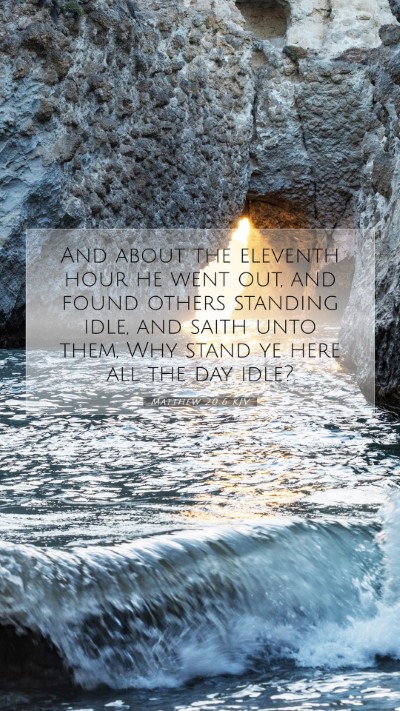Understanding Matthew 20:6
Matthew 20:6: "And about the eleventh hour he went out, and found others standing idle, and saith unto them, Why stand ye here all the day idle?"
Overview of Matthew 20:6
This verse is part of the Parable of the Laborers in the Vineyard, in which Jesus teaches profound lessons about grace, equity, and the Kingdom of Heaven. The context involves laborers who were hired at various times of the day, and the focus here on the eleventh hour highlights themes of mercy and the generosity of the vineyard owner, symbolizing God Himself.
Bible Verse Meanings
This verse points to the importance of divine calling and the urgency of service in God's kingdom. Just as the laborers were called at the last hour, so too are people invited into God’s service anytime, showcasing His loving invitation to all.
Bible Verse Interpretations
- Matthew Henry's Commentary: Henry emphasizes that the owner of the vineyard represents Christ, who seeks out the idle for work. This call is a representation of God’s grace, who invites all into His field, regardless of their timing or previous engagements.
- Albert Barnes' Notes: Barnes points out that the “idle” signify those who are spiritually unproductive. The Master in the parable offers work regardless of the time, illustrating that it's never too late to come to Christ.
- Adam Clarke’s Commentary: Clarke notes that the questions posed to the idle workers should invoke reflection among believers about their own spiritual diligence. The calling represents a chance for redemption and engagement in the Ministry.
Bible Verse Understanding
The question “Why stand ye here all the day idle?” challenges the reader to consider personal responsibility in responding to God’s call. It’s a reflection on faith and action, reinforcing the importance of being active in God’s work.
Scripture Analysis
This verse captures both urgency and opportunity, showcasing God’s flexibility in granting grace. The laborers' late arrival signifies the idea that all are welcome to receive the goodness of God, imploring believers to embrace His call without delay.
Biblical Exegesis
Analyzing this verse within the whole parable suggests a deeper meaning regarding God's justice and mercy. It challenges societal norms about merit and rewards. Therefore, this parable invites readers to understand that God’s grace does not operate on a human time frame.
Bible Study Insights
- Grace over Merit: The teachings suggest God’s gracious provision transcends human terms of fairness and reward.
- Value of All Callings: Emphasizes that every individual, regardless of when they come to God, holds value in the Kingdom.
- Reflection on Personal Faith: Encourages believers to assess how they are contributing to God’s work daily.
Related Bible Verses
- Matthew 9:37-38 - "Then saith he unto his disciples, The harvest truly is plenteous, but the labourers are few." This highlights the need for laborers in God’s vineyard.
- Luke 14:16-24 - The Parable of the Great Banquet illustrates the invitation to many, emphasizing inclusion.
- John 4:35 - "Lift up your eyes, and look on the fields; for they are white already to harvest." This aligns with the theme of urgency for laborers in God’s work.
Application of the Verse
Matthew 20:6 encourages us to evaluate our life’s purpose in light of God's kingdom. One should not wait until later, as God's call can come at any moment, and responding to it actively is vital for spiritual fulfillment.
Conclusion
In summary, Matthew 20:6 serves as a poignant reminder of God's grace and the call to work in His vineyard. The insights drawn from prominent commentaries enrich our understanding of this verse, encouraging continued exploration into its profound meanings.


